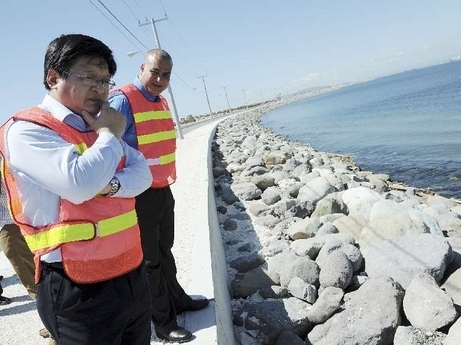This post is the first of a three-part series entitled, “Perceptions.” The series explore China’s historic and more recent relationship with Jamaica, particularly the way this newer relationship is characterized by Jamaican people and interest groups through the opinions voiced in the public domain.
 The island of Jamaica bears the marks of a legacy steeped in colonialism. The King Streets, St. Mary’s and St. Ann’s of the land bear witness to this; it is even evidenced in Jamaica’s practice of the Westminster Legislative System. To that end, Jamaican’s political and economic environments are characterized and influenced by partnerships with its former colonizer, the United Kingdom, and traditional economic and trade allies like the United States and Canada. The reds, whites and blues of alternate patterns have therefore been imprinted in Jamaica’s economic fabric and social consciousness.
The island of Jamaica bears the marks of a legacy steeped in colonialism. The King Streets, St. Mary’s and St. Ann’s of the land bear witness to this; it is even evidenced in Jamaica’s practice of the Westminster Legislative System. To that end, Jamaican’s political and economic environments are characterized and influenced by partnerships with its former colonizer, the United Kingdom, and traditional economic and trade allies like the United States and Canada. The reds, whites and blues of alternate patterns have therefore been imprinted in Jamaica’s economic fabric and social consciousness.
For the past few months however, print, broadcast and social media have generated significant public dialogue in assessing the country’s developing relationship with China –especially China’s sizeable financial investments – despite the reality that there has always, more or less, been a Chinese presence in Jamaica. In fact, a diplomatic friendship between Jamaica and the People’s Republic became official on November 21, 1972 even though the relationship has existed for far longer.
Chinese indentured servants first came to Jamaica in 1854 and generations of those families remain an integral part of culture, politics and business life in the country. The various Chinese-Jamaican owned restaurants that serve up dishes stewed and fried in Jamaican culinary culture; the ubiquitous shops and wholesales that are embedded in community life have all but cemented the image of Chinese-Jamaicans as brokers of economic power, socio-economic status and agents of commerce in the community. Their example of entrepreneurship, through the model of the family-owned wholesale, has been co-opted by the Jamaican business community.
Thus, while the Chinese-Jamaican relationship is not at all new, the nature of it certainly is.
As the world watches China rise in global dominance, Jamaica is looking to strengthen its ties with the world’s 2nd largest economic power as a strong business partner. It is no secret that China’s aggressive and strategic investments, since its 1978 reforms, have set them apart as a commercial giant thereby shifting their interests towards acquiring valuable raw materials and assets across the globe. It makes sense then that the already amicable relationship formed with Jamaica over forty years ago, and by extension other Caribbean nations, would provide the platform for an expansion of Chinese interests in the Western Hemisphere.
Underlying the media buzz around Jamaica’s new business partner however is a level of uncertainty in terms of how this partnership will play out in the coming years. For many Jamaicans, the increasingly visible presence of Chinese workers, expats and government officials’ throughout the country harp to memory of a colonial legacy of exploit and unilateral benefit by an external power.
As a result, both a vague skepticism and a level of curiosity have surfaced as an interesting consequence of China’s elevated presence in Jamaica and the rest of the Caribbean. The imbalance of questions to answers, particularly regarding China’s pledged financial support of the government’s proposed Logistics Hub project – on the condition that the project is sited off shore on Jamaica’s Goat Islands – feeds into a perception of mistrust among the majority of Jamaicans. We perceive as strange, the unfamiliar. Skepticism runs the gamut from mild concern to fear – loss of potential job opportunities to Chinese neo-colonization.
The ever-increasing economic power of the Chinese and their vested interest in the development of Jamaica is undeniable. What is explicit and implicit in this narrative on talk shows, lecture halls and verandahs is the question of whether it is a buyer’s or seller’s market; in that the Jamaican people are poised to see who holds the upper hand as deals are penned that will largely determine the course of development for the country.
Key photo credit: Jamaica and China sign four agreements during Jamaica’s Prime Minister, the Most Hon. Portia Simpson Miller’s, five-day official visit to China in August 2013.
In-text photo credit: Jamaica Gleaner, 11 Nov 2012



About The Author: Zaneta Scott
More posts by Zaneta Scott